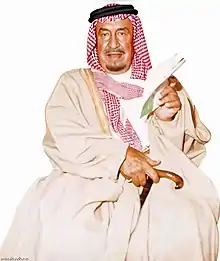Mohammed bin Saud Al Kabir
Mohammed bin Saud Al Kabir (1908 – November 1998) was a Saudi royal and a nephew of King Abdulaziz. He was the patriarch of the Al Kabir clan and a senior prince due to his in-depth tribal knowledge and connections.[1][2] His nickname was Shaqran.[3][4]
| Mohammed bin Saud Al Kabir | |||||
|---|---|---|---|---|---|
 | |||||
| Born | 1908 Riyadh | ||||
| Died | November 1998 (aged 89–90) | ||||
| |||||
| House | House of Saud | ||||
| Father | Saud Al Kabir | ||||
| Mother | Noura bint Abdul Rahman Al Saud | ||||
Early life
Prince Mohammed was born in Riyadh in 1908.[5] He was the youngest of Noura bint Abdul Rahman and Saud Al Kabir's three children.[1][6] Prince Mohammed's full-sisters were Hessa and Al Jawhara.[3][6] The latter was one of the wives of King Faisal.[3][6][7]
The mother of Prince Mohammed was elder sister of King Abdulaziz.[6][8] His father was from the Al Kabir branch of the House of Saud, consisting of descendants of Saud bin Faisal, elder brother of King Abdulaziz's father, Abdul Rahman Al Saud.[9]
Activities, personal life and death
Prince Mohammed joined some of the wars during the formation of Saudi Arabia.[5] Following the establishment of the state he mostly dealt with horse and camel breeding[5] and business.[10] In 1961 Prince Mohammed founded Yamama Cement company in Riyadh.[10] The company was one of the best performing construction firms in the region.[10] During the reign of King Khalid Prince Mohammed was ranked second in royal protocol just after the king.[11]
He had some eleven sons most of whom involve in business activities.[2] His eldest son, Abdullah, married to Seeta bint Abdulaziz, one of King Abdulaziz's daughters and King Abdullah's sister.[12] Prince Mohammed's other son, Sultan bin Mohammad, is a businessman.[13] Turki bin Mohammed, another son of him, was an assistant undersecretary at the Foreign Ministry for political affairs in 2000.[14] One of his daughters, Noura, is the wife of Mashour bin Abdulaziz and the mother of Sara bint Mashour who is Crown Prince Mohammed's spouse.
In January 2018 eleven of his grandsons were arrested in Riyadh following their protest in front of the Qasr Palace or the Palace of Government, demanding the abolition of the royal order that stipulated stopping the payment of their bills for electricity and water.[15] All princes were released one week later.[15] However, his great grandson, Salman bin Abdulaziz, and grandson, Abdulaziz bin Salman bin Mohammed, have been in detention since early 2018.[15]
Legacy
In Arar there is a health-care institution named after Prince Mohammed, Prince Mohammed bin Saud Al Kabir disease and dialysis center.[17] In Riyadh an annual horse race named the cup of Prince Mohammed bin Saud Al Kabir is organized.[18]
References
- Louisa Dris-Aït-Hamadouche; Yahia H. Zoubir (Spring 2007). "The US-Saudi Relationship and the Iraq War: The Dialectics of a Dependent Alliance". Journal of Third World Studies. 24 (2): 124.
- "Al Kabir Clan". Global Security. Retrieved 19 September 2020.
- "الأميرة نورة بنت عبدالرحمن و أسرار في تأسيس دولة السعودية". Echo Arabi (in Arabic). 2 November 2019. Retrieved 7 September 2020.
- Kholoud Al Abdullah (23 September 2014). "سعوديات خلدهن التاريخ". Rouge Magazine (in Arabic). Retrieved 9 September 2020.
- "الأمير محمد بن سعود الكبير.. عاشق الخيل ومرجع مهم في أصولها". Al Riyadh (in Arabic). 7 December 2012. Retrieved 7 September 2020.
- "نورة بنت عبد الرحمن.. السيدة السعودية الأولى". Al Bayan (in Arabic). 24 May 2020. Retrieved 7 September 2020.
- "Saudi Arabia" (Country Readers Series). Association for Diplomatic Studies and Training. p. 57. Retrieved 7 January 2021.
- "Noura bint Abdul Rahman.. Adviser to the King and the Secrets Portfolio". Saudi 24 News. 17 May 2020. Retrieved 22 September 2020.
- Joseph A. Kechichian (2001). Succession in Saudi Arabia. New York: Palgrave. ISBN 9780312238803.
- "100 best - performing construction stocks". Construction Week. 20 March 2014. Retrieved 10 October 2020.
- William B. Quandt (1 December 2010). Saudi Arabia in the 1980s: Foreign Policy, Security, and Oil. Brookings Institution Press. p. 86. ISBN 978-0-8157-2051-5.
- Haifa Al Dosari (9 April 2019). "Princess Lolowah Al Faisal's celebrated journey for women's rights". Women 2030. Retrieved 7 September 2020.
- "Top 100 most powerful Arabs 2019". Gulf Business. Retrieved 16 September 2020.
- "Saudi Arabia signs treaty to eliminate discrimination against women". Middle East News Online. September 2000. Retrieved 7 September 2020.
- "هكذا يعبر مئات الأمراء من آل سعود عن رفضهم لابن سلمان". Arabi 21 (in Arabic). 25 August 2020. Retrieved 12 September 2020.
- Sharaf Sabri (2001). The House of Saud in Commerce: A Study of Royal Entrepreneurship in Saudi Arabia. Sharaf Sabri. p. 214. ISBN 978-81-901254-0-6.
- "Places / Health / Prince Mohammed bin Saud Al Kabir disease and dialysis center". Wafy. Retrieved 7 September 2020.
- "Saudi Crown Prince to patronize annual horse race". Al Bawaba. 31 October 2002. Retrieved 7 September 2020.